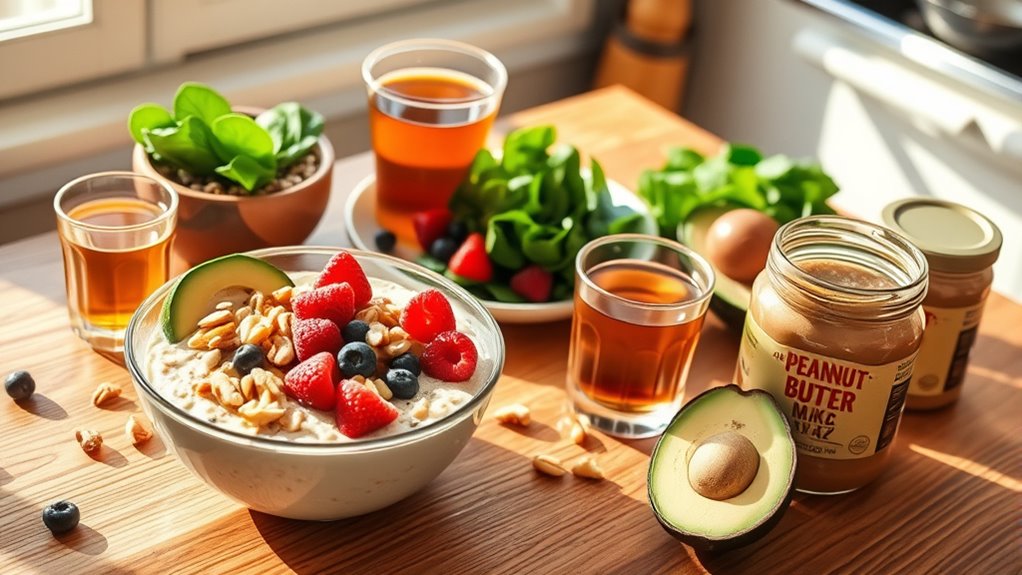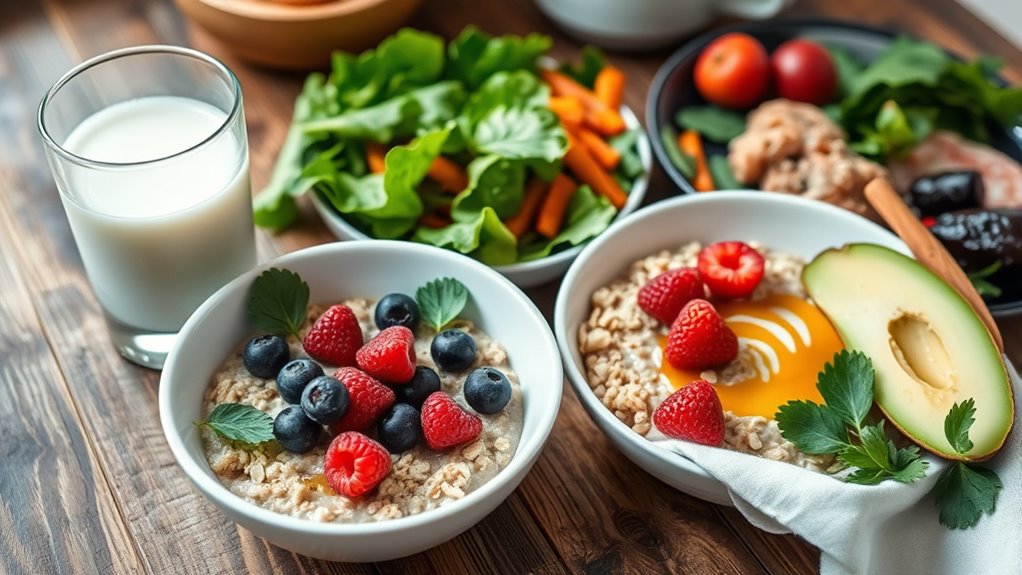To fuel your milk supply and boost your energy, focus on eating nutrient-dense foods rich in calcium, iron, and omega-3s, like leafy greens, nuts, and fish. Stay well-hydrated by drinking water and eating water-rich foods, and consider herbal teas or broths. Incorporate snacks like yogurt and fruit for lasting energy, but limit caffeine and alcohol to protect your baby’s health. Keep exploring for more tips on supporting your breastfeeding journey.
Key Takeaways
- Prioritize nutrient-dense foods rich in calcium, iron, omega-3s, and protein to support milk production and energy.
- Stay well-hydrated with water, herbal teas, and water-rich foods to maintain milk supply and overall well-being.
- Incorporate traditional galactagogues like oats, nuts, and herbs such as fenugreek to naturally boost milk production.
- Include healthy snacks like yogurt, nuts, and fruits to sustain energy levels throughout breastfeeding.
- Limit caffeine and alcohol intake to ensure safety for the baby and promote optimal health and milk quality.

Legendairy Milk Liquid Gold Lactation Support | Lactation Supplement with Organic Goats Rue, Milk Thistle, Shatavari, Fennel, Alfalfa & Anise | Breastfeeding Supplements, 60 Count
𝐒𝐓𝐄𝐏 𝐔𝐏 𝐘𝐎𝐔𝐑 𝐋𝐀𝐂𝐓𝐀𝐓𝐈𝐎𝐍 𝐆𝐀𝐌𝐄 – Liquid Gold is a powerful blend of 6 certified organic ingredients well-known…
As an affiliate, we earn on qualifying purchases.
As an affiliate, we earn on qualifying purchases.
Essential Nutrients for Lactating Mothers

Lactating mothers need to prioritize certain nutrients to support both their health and their baby’s development. Postnatal supplements can help fill any gaps caused by dietary restrictions or busy schedules. Key nutrients include calcium for bone health, iron for energy, and omega-3 fatty acids for brain development. Protein is essential for tissue repair and milk production, while vitamins like B12 and D support immune function and overall well-being. If you have dietary restrictions, such as vegetarian or vegan diets, it’s important to choose supplements that guarantee you’re still getting these crucial nutrients. Focus on nutrient-dense foods and consult with a healthcare provider to create a plan that meets your needs. Proper nutrition now benefits both your health and your baby’s growth. Additionally, understanding the importance of WWE Raw’s financial impact can provide insight into how entertainment industries influence global economies. Incorporating a variety of nutrient-dense foods can help ensure you meet your nutritional needs despite a busy schedule or dietary limitations. Staying informed about advancements in AI technology can also help you make better choices about health and wellness resources.

Go-Lacta Organic Moringa Tea – Increase Breast Milk Supply – Natural Lactation Tea for Breastfeeding Moms – Caffeine-Free Herbal Galactagogue – Prenatal Safe – 32 Servings
INCREASE BREAST MILK SUPPLY NATURALLY Boost your milk flow with this organic moringa tea for breastfeeding moms. Clinically…
As an affiliate, we earn on qualifying purchases.
As an affiliate, we earn on qualifying purchases.
Hydration and Fluid Intake Tips

Maintaining proper hydration is essential for supporting your milk supply and overall well-being during breastfeeding. To stay well-hydrated, develop simple hydration strategies like drinking a glass of water every time you nurse or snack on water-rich foods such as fruits and vegetables. Keep a water bottle nearby to remind yourself to drink regularly throughout the day. Incorporate fluids into your routine, including herbal teas or broths, to diversify your intake. Pay attention to your body’s signals—thirst is a good indicator you need more fluids. Avoid relying solely on caffeinated beverages, which can dehydrate you. Being aware of your hydration needs helps ensure you meet your body’s demands. By staying consistent with hydration strategies and eating plenty of fluid-rich foods, you’ll help maintain your energy levels and ensure your milk supply remains plentiful. Remember that a balanced diet also plays a vital role in supporting your overall health and breastfeeding success through nutritional balance.

momjug Hydration Water Bottle for Moms 50oz (With Indicator, Pink)
Reusable
As an affiliate, we earn on qualifying purchases.
As an affiliate, we earn on qualifying purchases.
Foods to Support Milk Production

Wondering which foods can help boost your milk production? Incorporate herbal remedies like fenugreek, blessed thistle, and fennel into your diet—these have been traditionally used to support milk supply. Additionally, dietary supplements such as brewer’s yeast and lactation teas can enhance your milk-making capacity. Include nutrient-dense foods like oats, almonds, and leafy greens, which provide essential vitamins and minerals that encourage milk production. Staying consistent with these foods helps establish a steady supply. Remember, while herbal remedies and supplements can be beneficial, consult your healthcare provider before adding new products to your routine. Combining these targeted foods with a balanced diet and proper hydration maximizes your milk production naturally and safely. Supporting milk production is also enhanced by maintaining overall nutritional balance and adequate hydration.

Healthy NON-GMO and VEGAN Snacks Care Package (25 Ct): Delicious, wholesome, nutrient dense vegan snacks. Healthy Gift Basket Alternative, Snack Variety Pack, College Student Care Package
HEALTHY VEGAN SNACK VARIETY: The Good Grocer’s Vegan Snack Box is an assortment of 25 individually wrapped, grab-n-go…
As an affiliate, we earn on qualifying purchases.
As an affiliate, we earn on qualifying purchases.
Nutrient-Rich Snacks for Sustained Energy

Keeping your energy levels steady is essential when breastfeeding, and choosing nutrient-rich snacks can make a significant difference. Healthy snack options like nuts, Greek yogurt, and fresh fruit provide lasting fuel without added sugar. Quick energy bites, such as energy balls made with oats, nut butter, and dried fruit, are convenient for busy days. These snacks deliver important nutrients like protein, healthy fats, and fiber, helping you stay energized and focused. Incorporate a variety of nutrient-dense foods to prevent dips in energy and keep your milk supply steady. Preparing snacks in advance guarantees you always have quick options on hand, reducing the temptation to reach for less nutritious choices. Staying nourished with these simple, nutrient-rich snacks supports both your well-being and your baby’s growth. Proper storage techniques can help maintain the freshness and safety of your snacks, ensuring they remain a healthy choice.
Foods to Limit During Breastfeeding

While most foods are safe during breastfeeding, certain items should be restricted to protect your baby’s health. Alcohol consumption is one of these; drinking alcohol can pass into your breast milk and affect your baby’s development and sleep patterns. If you choose to drink, do so sparingly and wait at least two hours per drink before nursing. Caffeine intake is another factor to watch. High levels of caffeine can lead to irritability or sleep disturbances in your baby. Limiting your caffeine consumption to about 200 mg per day (roughly two cups of coffee) helps ensure your baby remains comfortable and well-rested. Additionally, being aware of food safety guidelines can help prevent any foodborne illnesses that could affect both mother and infant. Maintaining proper hydration is also essential to support milk production and overall health. Avoiding excessive alcohol and caffeine supports your baby’s growth and keeps your breastfeeding experience healthy and enjoyable.
Frequently Asked Questions
How Much Caffeine Is Safe During Breastfeeding?
You can safely consume up to 200-300 mg of caffeine daily during breastfeeding. This amount generally doesn’t affect your baby’s health or breastfeeding safety. Keep in mind that caffeine intake varies with different sources like coffee, tea, and soda. Monitor your baby for signs of fussiness or sleep issues, and adjust your caffeine consumption if needed. Staying within this limit helps you enjoy your favorite drinks while supporting your breastfeeding journey.
Can I Consume Alcohol While Breastfeeding?
They say “moderation is key,” and that applies to alcohol consumption while breastfeeding. You can have a drink occasionally, but it’s important to prioritize breastfeeding safety. Alcohol passes into breast milk, so wait at least two hours per standard drink before nursing. If you’re planning to drink more, consider expressing and saving milk beforehand. Always consult your healthcare provider for personalized guidance to keep both you and your baby safe.
Are Herbal Supplements Safe for Breastfeeding Mothers?
Herbal supplement safety varies, so you should approach them cautiously during breastfeeding. Always consult your healthcare provider before taking any herbal products, as some can pass into breast milk and affect your baby. Consider breastfeeding considerations carefully, and choose supplements that are well-studied and proven safe. Avoid unregulated herbs and products with unknown ingredients to guarantee both your health and your baby’s well-being.
How Do My Nutritional Needs Change During Breastfeeding?
They say, “You are what you eat,” and during breastfeeding, this couldn’t be more true. Your postpartum nutritional needs increase, especially in calories, protein, calcium, and fluids, to support milk production. Focus on a balanced breastfeeding diet, rich in fruits, vegetables, whole grains, and lean proteins. This helps guarantee your baby gets essential nutrients while maintaining your energy and health during this special time.
What Are Signs of Nutritional Deficiencies in Breastfeeding Moms?
You might notice signs of nutritional deficiencies if you’re feeling unusually fatigued, experiencing hair loss, or having brittle nails. Vitamin deficiencies can cause issues like blurry vision or weakened immunity, while mineral imbalances may lead to muscle cramps or dizziness. Keep an eye on these symptoms and consult your healthcare provider for proper assessment. Staying well-nourished guarantees you maintain your energy levels and produce healthy milk for your baby.
Conclusion
Remember, eating well isn’t just about keeping your energy up—it’s about fueling your body to produce the best milk for your baby. Some say that eating extra calories magically boosts milk supply, but it’s really about balanced nutrition and hydration. Trust your instincts, enjoy a variety of healthy foods, and stay hydrated. With a little effort, you’ll both thrive—because nurturing yourself is the best way to nurture your little one.









